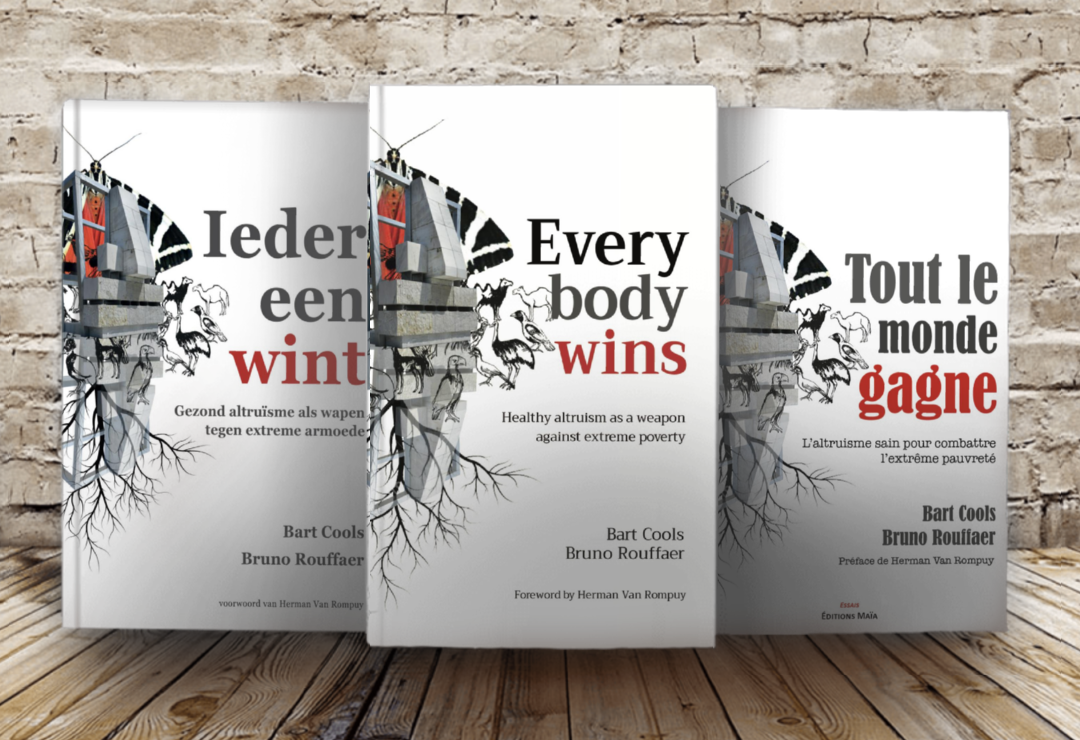(Extract from the book “Everybody wins”, by Bart Cools and Bruno Rouffaer)
In 2014, we were in Peru on a private trip, during which we visited some development projects for potato farmers 3000 meters high in the Andes, close to Andahuaylas. We never received so many gifts as from those poor people. This came to mind when I read in Bart and Bruno’s book how life satisfaction and emotional well-being do not depend on money (and yet) and that Latin America is the happiest continent.
I also begin this foreword with a positive message as in the book “Everybody wins”. The subtitle is ‘healthy altruism as a weapon against extreme poverty’. There have been spectacular results in all parts of the world in recent decades. Yes, there is progress! The amount of people living in extreme poverty has more than halved since the year 2000. Since 1990, over one billion people have escaped extreme poverty. Of course, as long as 10% of the world’s population lives in such degrading conditions, there is still a long way to go.
Anyone who only looks at what is going wrong is missing an opportunity to give hope, the virtue that is so desperately needed today, especially in the West, consumed as it is by fear. Giving hope must, of course, be based on facts. The book offers carloads of them and teaches us to read figures carefully. The positive thinking of the two authors is not a pep talk or what the French call ‘la méthode Coué’, a description of autosuggestion. COVID has admittedly caused a lot of damage. Perhaps ten years of economic growth will be needed to bring the number of extremely poor back to pre-pandemic levels. There are not only the 3.8 million dead worldwide but some survivors have a much harder time. Inequalities are already historically high in South Africa and Latin America, but they were also growing elsewhere even after 2020. We were in the same storm, but not in the same boat.
The authors delve deeper into the question that so many have struggled with throughout history: is man good or evil? Rousseau or Hobbes? The answer recently given by a young Dutchman was: ‘most people are good’ (Rutger Bregman). The book’s answer is also that. Man is a survivor and he cannot do this alone. Man needs others, and he prefers to do this with others. The cultural differences mean it is always with different emphasis and in different contexts, although these differences are much smaller than many of us think. After all, we are all human beings. Parenting plays a major role, including ‘collective’ upbringing based on education and leadership at all levels. If the leader spreads the poison of ‘enemy thinking’ it has a herd effect. Individuals easily follow the leader, especially if he warns of ‘enemies’. COVID has taught us that our fates are linked. Of course, there were oblique marauders, but the vast majority followed the rules, partly out of self-preservation but also in solidarity with the most vulnerable, usually from their own families. Of course, the science of vaccines prevented us from reliving a repeat of the Spanish flu, but the authors and I are concerned with the moral aspect. In Peru, Bruno and Bart found gripping examples of solidarity. Henriette Roland-Holst already wrote a century ago: ‘The soft forces will certainly win in the end’, if not she said ‘all warmth would freeze inside’.
There is still a lot of inhumanity today. People can become perverts if they are encouraged to do so or if there is impunity. A small group can destroy a “society”. Europe has learned lessons from its tragic history and the barbaric first half of the twentieth century. This is not the case everywhere. People are sometimes blinded by being told that their nation or race is superior or that others threaten their identity. Therefore, we must be careful that we do not limit solidarity to one’s tribe or family. Such tribalism is natural. Transcending the interests of one’s own group requires an effort. That is where real ethics begin. No ‘own poor first’!
The authors want to show how the combined efforts of people here and elsewhere can reduce extreme poverty. It requires the right attitude of healthy altruism. I like the realism of the book. Altruism is not about saints or heroes. Giving alone is not sustainable for mere mortals. There must be room for reciprocity, for a ‘return’. The vernacular says that ‘love must come from both sides’. It should not be about taking or giving. It is a matter of Me and You. The Zulus and the Bantus say ‘I am because you are’. We both become better people because of it.
It is about searching for the meaning of life. You can never find it in the mere Ego, in the calculus towards maximum pleasure, profit or success. Meaningfulness lies in giving. Those who live meaningful lives are most likely to find happiness. Meaning = happiness = the other.
Bruno Rouffaer and Bart Cools discovered this equation in their lives. They have “seen the light”. The challenge is to live consistently from there, again not as fundamentalists and ‘pure’ altruists but as human beings of good will. Everybody will win.
Herman Van Rompuy
President Emeritus of the European Council
Minister of State, Belgium
More information on the book “Everybody wins”: www.everybody-wins.eu
